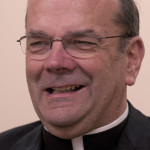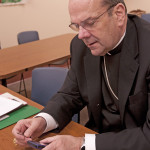By Connie Berry
SUN editor
Q. What was your first reaction when you were asked to come to Syracuse to serve as bishop? Who asked you and how did you come to say, “Yes”?

A. On Monday, March 30, I received a phone call from Archbishop Sambi, the papal nuncio. He told me in that phone conversation that it was the wish of the Holy Father that I be the next Bishop of Syracuse. I was surprised. I didn’t expect him to say I would be going to a diocese so close by. The Archbishop said, “I have news for you that I hope will be happy for you.” I told him I was happy. I will always do what the Holy Father asks so I said “yes” immediately. I’d say I was off the phone in less than five minutes. Then it was three long weeks to wait in between.
Q. How would you define the role of bishop?
A. The bishop is to be a source of unity in the diocese. His function is to be a pastor and a shepherd of souls. I come to proclaim the Gospel, to teach and to celebrate the sacraments with the Catholic faithful.
Q. What should the role of bishop be in regard to his priests?
A. My initial priority is to get to know the priests. The bishop should be father, brother and friend to his priests. I will do my best to establish a relationship with them. It doesn’t mean we’ll always be in agreement. I plan to meet with priests in their different areas, spend some time with them and get to know what is happening in their lives.
Q. Can you describe your particular style of leadership?
A. I like to know what’s going on. When I delegate responsibilities I expect the person to fulfill them in accordance to what they know my mind to be. I depend upon them and their expertise in their areas to fulfill the mission of the church.
Q. Can you explain your motto and why you selected it?
A. “The Church Our Mother” [Ecclesia Mater Nostra] is my motto and it is based upon the fact that I believe the church nurtures and supports us on our journey in life. The church is also there embracing us through the highs and lows. I feel that the church really sustains us.
Q. Can you tell us about your time in Ogdensburg? What really defined your
experience there? What did you enjoy most about your time there?
A. I moved there from a mid-sized city, Buffalo, to a smaller community. What I really enjoyed most is the priests and the people. They were very friendly. I learned to live in a small town. As a diocese, we had over 6,000 people take part in our “Why Catholic?” program. It is a renewal program with small group discussions. We strengthened parishes. There were some closings and some consolidations. We had a successful stewardship appeal and our annual fund was renewed then. We tried to work on vocations. We have four seminarians. We lost one who was to be ordained in May. That was very difficult. [The seminarian died suddenly in late January 2009.]
Q. Even though the dioceses are close to each other geographically, what do you see as differences between the two?
A. Ogdensburg is rural. There are three cities in the diocese. Watertown has a population of about 28,000 people. Syracuse is a larger metropolitan area but it has a large number of smaller, rural communities. I have been here to visit but I could still get lost. Really, in the church, I find that people are the same everywhere. They have the same goal — to try to get closer to the Lord.
Q. What was it like to grow up in Buffalo in the 1960s?
A. Well, that would have been growing up in the 1950s and 60s. The 1950 parish was not only focused on religious life but also other aspects. There was the CYO, Scouts, altar servers, parochial schools. I was never in a classroom in a Catholic school with fewer than 60 students with a sister teaching the class.

Q. There is a growing concern for family life in this country. What advice would you give parents who are striving to teach their children to follow Jesus?
A. That parents follow Jesus themselves. We have to do all we can to share our faith with young children. When children see us praying — through family prayer and doing things together that show a relationship to the church it is helpful. We get so caught up. For all the great good that technology brings, it also brings a downside. When kids are more interested in playing on their Gameboy than in talking to you, there is a problem. So we have to build-in time.
Q. How were you prepared to do that within your own family?
A. In my family as I was growing up, Sunday Mass was a given. Saying prayers every day was a given. Going to Catholic school was a given. In our house the church’s customs were always followed. Religion was always present but not oppressive. I have two older siblings — I’m the baby. They both live outside Buffalo. When we were kids we didn’t have all the organized activities they have today.
Q. Is there any one moment that you recall when you decided to become a priest?
A. I wouldn’t say there was any one moment. My pastor was at our parish for 45 years. He told me I should go to prep seminary and I should think about becoming a priest. I did that and it seemed like the right fit from the beginning. I can honestly say there has never been a time I’ve regretted that decision. You never want to lose touch with being a parish priest, visiting the sick in hospitals, visiting kids in school, calling on someone who is confined at home. Basically, you never want to stop being with the people during all the different moments of their lives.
Q. Who is your favorite saint and why?
A. That’s a tough one. Certainly St. Therese of the Child Jesus, St. Francis. I admire St. Thomas Moore and St. John Neumann who founded my home parish.
Q. Are you familiar with Blessed Mother Marianne’s cause for sainthood?
A. I am familiar with her, but it has been at a distance. I have read about both Mother Marianne and Father Damien. They [the Sisters of St. Francis] just gave me a book about her life so I’ll have some reading to do.
Q. What do you like to do during your leisure time?
A. I take a walk every day. I’ve been taking it along the St. Lawrence River so I’ll have to find a new route. I read, I listen to music. Some days I just get in the car and go for a ride.
Q. How would you describe your spiritual life?
A. I obviously think there is nothing more important than daily Mass. The Liturgy of the Hours, time for prayer before the Blessed Sacrament, regular recitation of the rosary is important.
We should always have some kind of spiritual reading available. None of us, no matter who we are, will ever reach the heights of spiritual life.
Q. What is the last good book you read, besides the Bible?
A. I just finished two books — American Lion: Andrew Jackson in the White House and America’s Bishop: The Life and Times of Fulton J. Sheen. Did you know Bishop Moynihan is mentioned in that book?
Q. What are you looking forward to most as you come to the Syracuse Diocese?
A. Getting to know the priests and the people of the diocese and finding how I can help them on their faith journey. Getting to know the needs of the people.
Q. What is the number one message you want the people of the Syracuse Diocese to hear as you begin this journey?
A. I would like them to understand that we’re in this together and that we need to be effective and sincere witnesses to the faith in order to bring others along. I’d like to renew the appreciation of all that the church does in pastoral, educational, charitable works, to serve the needs of the people of this area. And, The Catholic SUN is an important instrument of evangelization. Catholic newspapers are the strong right arm of the bishop in reaching the people and as a source of unity in the diocese.



